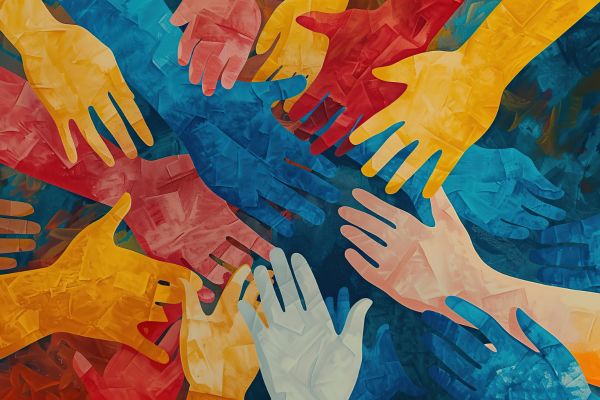Insights
INSIGHTS
All Topics
Charities raising awareness of human rights issues in Qatar
19 Dec 2022by Joe Lepper
We look at how charities are raising awareness of human rights issues around the controversial 2022 World Cup in Qatar
The 2022 FIFA World Cup taking place in Qatar looks to be the event’s most controversial yet. One controversy concerns the Gulf state’s human rights record, particularly their treatment of migrant workers, who have been involved in getting stadia and infrastructure ready.
Another concerns the country’s track record around the rights of women and LGBTQ+ people, with many football fans put off visiting the country for fear they will be imprisoned.
Here we look at the human rights issues around Qatar and how charities are looking to ensure the plight of migrant workers and others are not forgotten as football fans enjoy the matches.
Migrant workers
Concerns have been raised by human rights charities for several years over employment rights in Qatar among migrant workers.
A key concern is the use of the Kafala system of sponsored labour, which gives private citizens and companies in Qatar total control over migrant workers’ employment and immigration status. This system arose from high demand for cheap labour in Gulf states and desperation from migrant workers in Asia in search of work.
As a result, migrant workers, including construction workers and domestic servants, have faced considerable red tape and legal challenges if they wanted to change jobs, with many unable to do so without permission of their employer.
There is a minimum wage in Qatar, but salary theft by employers with no recourse in justice is rife, according to Amnesty International, one of the charities raising awareness of worker rights issues in the country.
Deaths of migrant construction workers is another concern. Although there are no official figures, it has been variously reported by charities and media outlets that hundreds and possibly thousands have died.
According to official data 15,021 non-Qatari nationals have died over the last decade. Of these almost two thirds are Asian and just under nine out of ten are men, which fits the demographic of construction workers, as pointed out sports website The Athletic.
LGBTQ+ and women’s rights
Same sex relationships between men are an offence in Qatar, punishable by up to seven year’s imprisonment.
Meanwhile, women in the country have their rights curtailed through a guardianship system, whereby their lives are the responsibility of a male guardian, either a family member or their husband. Women in Qatar need permission from their guardian for a raft of everyday decisions, such as working, travelling, and studying.
Divorce is difficult, according to Amnesty International, and women that do are unable to be their child’s guardian.
Charities raising concerns
Amnesty’s six areas of concern
Amnesty is among several human rights charities raising concerns around the treatment of migrants, women, and LGBTQ+ people in Qatar. Just days before the start of the tournament it released an online guide highlighting six key areas of concern.
As well as previously mentioned issues around labour, women, and LGBTQ+ rights, it is concerned around unfair trials in Qatar.
“[We have] documented cases of unfair trials where defendants’ claims of torture and ill-treatment were never investigated, and sentences were handed down based on coerced ‘confessions’,” says Amnesty International. “Often, defendants were interrogated while held in incommunicado detention without access to a lawyer or translator.”
Another concern it has raised is around press freedom and a lack of independent media in the country. Freedom of association is also curtailed, points out Amnesty, which bars migrant workers from joining trade unions and “citizens and migrant workers alike face repercussions for peaceful assembly”.
According to the charity Migrant Rights, in August 2022, hundreds of migrant workers were arrested and deported for protesting over a failure by their employers to pay their wages.
#Qatari officials have detained around 60 Al Bandary Engineering and Electro Watt employees who protested unpaid wages, and began deportations last night. Close to 200 migrant workers had taken to the streets in the industrial area on 14 August 2022. https://t.co/udmgYms6dX
— Migrant Rights (@MigrantRights) August 18, 2022
Lobbying FIFA
More than 20 human rights charities and organisations have written an open letter to FIFA president Gianni Infantino calling on the global footballing body to work with the Qatari government, trade unions, and civil society to tackle human rights abuses in the country.
FIFA is also being called on to set aside £372m ($440m) in prize money to pay the families of workers who have died, settle unpaid wages, and reimburse any fees migrant workers may have incurred. The money should also be used to protect workers’ rights in the future, states their letter.
This has been signed by among others Human Rights Watch, Amnesty International, Eqidem, and the Nepal based Asian Human Rights and Culture Development Forum, as many migrant workers in Qatar are Nepalese.
LGBTQ+ action
Stonewall is among charities to raise concerns over the treatment of LGBTQ+ people in Qatar.
It is looking to raise awareness by filling a virtual stadium of supporters of LGBTQ+ issues “to shine a light on the injustices that our communities face in Qatar”.
Its Proud Stadium campaign aims to gather 80,000 signatories protesting about human rights in Qatar to “send a powerful message to global leaders”. As of November 15, more than 25,000 people had signed.
Amazing! Over 25,000 people have now joined our #ProudStadium - that's more than the stadium capacity of...@Official_Darlo@BlackpoolFC @Official_BRFC @dundeeunitedfc @Pompey @ReadingFC @WatfordFC
— Stonewall (@stonewalluk) November 15, 2022
Stand with LGBTQ+ people in Qatar ➡️ https://t.co/tgVjXR3jOD pic.twitter.com/Kohy4hY589
Joe Lepper
More on this topic
Recommended Products
Our Events
Charity Digital Academy
Our courses aim, in just three hours, to enhance soft skills and hard skills, boost your knowledge of finance and artificial intelligence, and supercharge your digital capabilities. Check out some of the incredible options by clicking here.


















